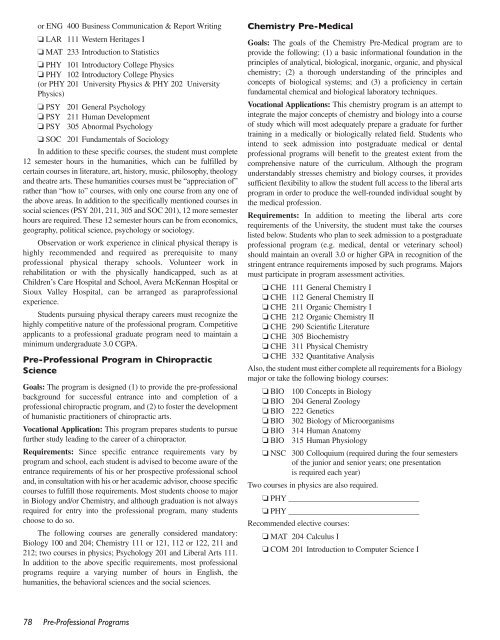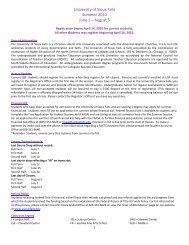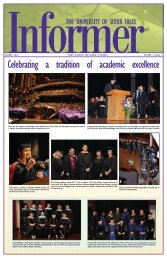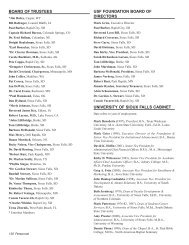USF TELEPHONE DIRECTORY - University of Sioux Falls
USF TELEPHONE DIRECTORY - University of Sioux Falls
USF TELEPHONE DIRECTORY - University of Sioux Falls
You also want an ePaper? Increase the reach of your titles
YUMPU automatically turns print PDFs into web optimized ePapers that Google loves.
or ENG 400 Business Communication & Report Writing<br />
❏ LAR 111 Western Heritages I<br />
❏ MAT 233 Introduction to Statistics<br />
❏ PHY 101 Introductory College Physics<br />
❏ PHY 102 Introductory College Physics<br />
(or PHY 201 <strong>University</strong> Physics & PHY 202 <strong>University</strong><br />
Physics)<br />
❏ PSY 201 General Psychology<br />
❏ PSY 211 Human Development<br />
❏ PSY 305 Abnormal Psychology<br />
❏ SOC 201 Fundamentals <strong>of</strong> Sociology<br />
In addition to these specific courses, the student must complete<br />
12 semester hours in the humanities, which can be fulfilled by<br />
certain courses in literature, art, history, music, philosophy, theology<br />
and theatre arts. These humanities courses must be “appreciation <strong>of</strong>”<br />
rather than “how to” courses, with only one course from any one <strong>of</strong><br />
the above areas. In addition to the specifically mentioned courses in<br />
social sciences (PSY 201, 211, 305 and SOC 201), 12 more semester<br />
hours are required. These 12 semester hours can be from economics,<br />
geography, political science, psychology or sociology.<br />
Observation or work experience in clinical physical therapy is<br />
highly recommended and required as prerequisite to many<br />
pr<strong>of</strong>essional physical therapy schools. Volunteer work in<br />
rehabilitation or with the physically handicapped, such as at<br />
Children’s Care Hospital and School, Avera McKennan Hospital or<br />
<strong>Sioux</strong> Valley Hospital, can be arranged as parapr<strong>of</strong>essional<br />
experience.<br />
Students pursuing physical therapy careers must recognize the<br />
highly competitive nature <strong>of</strong> the pr<strong>of</strong>essional program. Competitive<br />
applicants to a pr<strong>of</strong>essional graduate program need to maintain a<br />
minimum undergraduate 3.0 CGPA.<br />
Pre-Pr<strong>of</strong>essional Program in Chiropractic<br />
Science<br />
Goals: The program is designed (1) to provide the pre-pr<strong>of</strong>essional<br />
background for successful entrance into and completion <strong>of</strong> a<br />
pr<strong>of</strong>essional chiropractic program, and (2) to foster the development<br />
<strong>of</strong> humanistic practitioners <strong>of</strong> chiropractic arts.<br />
Vocational Application: This program prepares students to pursue<br />
further study leading to the career <strong>of</strong> a chiropractor.<br />
Requirements: Since specific entrance requirements vary by<br />
program and school, each student is advised to become aware <strong>of</strong> the<br />
entrance requirements <strong>of</strong> his or her prospective pr<strong>of</strong>essional school<br />
and, in consultation with his or her academic advisor, choose specific<br />
courses to fulfill those requirements. Most students choose to major<br />
in Biology and/or Chemistry, and although graduation is not always<br />
required for entry into the pr<strong>of</strong>essional program, many students<br />
choose to do so.<br />
The following courses are generally considered mandatory:<br />
Biology 100 and 204; Chemistry 111 or 121, 112 or 122, 211 and<br />
212; two courses in physics; Psychology 201 and Liberal Arts 111.<br />
In addition to the above specific requirements, most pr<strong>of</strong>essional<br />
programs require a varying number <strong>of</strong> hours in English, the<br />
humanities, the behavioral sciences and the social sciences.<br />
78 Pre-Pr<strong>of</strong>essional Programs<br />
Chemistry Pre-Medical<br />
Goals: The goals <strong>of</strong> the Chemistry Pre-Medical program are to<br />
provide the following: (1) a basic informational foundation in the<br />
principles <strong>of</strong> analytical, biological, inorganic, organic, and physical<br />
chemistry; (2) a thorough understanding <strong>of</strong> the principles and<br />
concepts <strong>of</strong> biological systems; and (3) a pr<strong>of</strong>iciency in certain<br />
fundamental chemical and biological laboratory techniques.<br />
Vocational Applications: This chemistry program is an attempt to<br />
integrate the major concepts <strong>of</strong> chemistry and biology into a course<br />
<strong>of</strong> study which will most adequately prepare a graduate for further<br />
training in a medically or biologically related field. Students who<br />
intend to seek admission into postgraduate medical or dental<br />
pr<strong>of</strong>essional programs will benefit to the greatest extent from the<br />
comprehensive nature <strong>of</strong> the curriculum. Although the program<br />
understandably stresses chemistry and biology courses, it provides<br />
sufficient flexibility to allow the student full access to the liberal arts<br />
program in order to produce the well-rounded individual sought by<br />
the medical pr<strong>of</strong>ession.<br />
Requirements: In addition to meeting the liberal arts core<br />
requirements <strong>of</strong> the <strong>University</strong>, the student must take the courses<br />
listed below. Students who plan to seek admission to a postgraduate<br />
pr<strong>of</strong>essional program (e.g. medical, dental or veterinary school)<br />
should maintain an overall 3.0 or higher GPA in recognition <strong>of</strong> the<br />
stringent entrance requirements imposed by such programs. Majors<br />
must participate in program assessment activities.<br />
❏ CHE 111 General Chemistry I<br />
❏ CHE 112 General Chemistry II<br />
❏ CHE 211 Organic Chemistry I<br />
❏ CHE 212 Organic Chemistry II<br />
❏ CHE 290 Scientific Literature<br />
❏ CHE 305 Biochemistry<br />
❏ CHE 311 Physical Chemistry<br />
❏ CHE 332 Quantitative Analysis<br />
Also, the student must either complete all requirements for a Biology<br />
major or take the following biology courses:<br />
❏ BIO 100 Concepts in Biology<br />
❏ BIO 204 General Zoology<br />
❏ BIO 222 Genetics<br />
❏ BIO 302 Biology <strong>of</strong> Microorganisms<br />
❏ BIO 314 Human Anatomy<br />
❏ BIO 315 Human Physiology<br />
❏ NSC 300 Colloquium (required during the four semesters<br />
<strong>of</strong> the junior and senior years; one presentation<br />
is required each year)<br />
Two courses in physics are also required.<br />
❏ PHY _________________________________<br />
❏ PHY _________________________________<br />
Recommended elective courses:<br />
❏ MAT 204 Calculus I<br />
❏ COM 201 Introduction to Computer Science I








